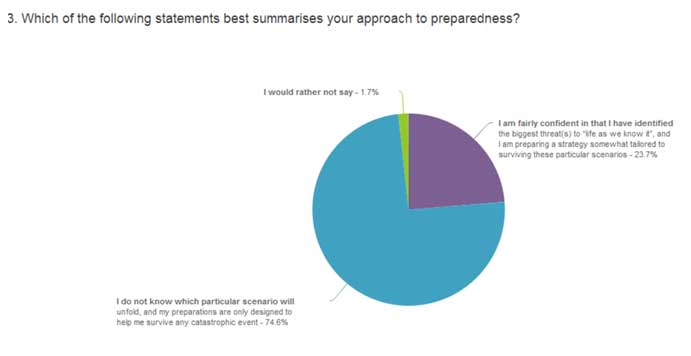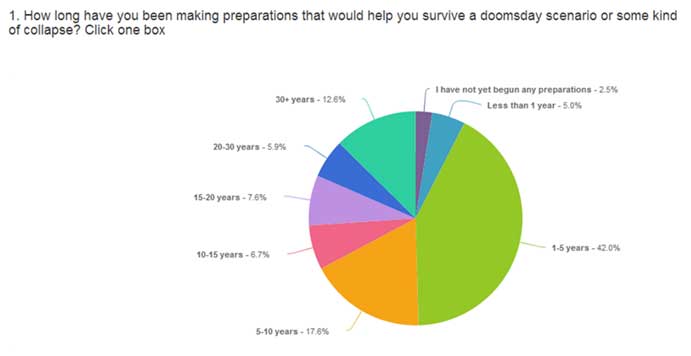Editors Note by Pat Henry: I received an email from Michael Mills who is a Ph.D. candidate and Assistant Lecturer in the School of Social Policy, Sociology and Social Research at University of Kent (England). He is undertaking 3 years of research on the preparedness community in America and Britain for his doctoral thesis. As part of his research he is conducting an online survey of preppers to get feedback from actual people who self-identify as preppers. It is hoped that this survey and his research will also lead to various media and academic publications. In this article he will explain some of the problems and misconceptions his research aims to address, and will appeal for participants for anonymous interviews that will allow inaccurate and misrepresentative stereotypes of preppers to be challenged. In short, the goal is all about understanding preppers and why we do what we do.
I took this survey myself and the questions are pretty basic. There are as many multiple choice as there are open comment fields and at no time was I asked for any data that would identify me by name. Although we know that the NSA knows everything we are doing online anyway. If you would like to participate in Michael’s research and contribute to a research paper whose stated aim is to resolve misconceptions about real preppers, please read on.
I’m sure many will agree that the popular public images (shaped by various TV documentary series and other content) fall short in giving various audiences an accurate understanding of prepping. For many, ill-informed speculation leads to the impression that prepping is purely the domain of tiny religious cults, violent marauders, and mentally-disturbed hermits.
My research is takes an open-minded and more objective position in looking at prepping. Prepping is an activity engaged with by millions (in America, and worldwide), and is deserving of such serious attention. In doing so, it hopes to shed light on the various features of preparedness that continue to be unknown to those outside of the movement. You can read more about the project here.
A few months ago I launched an online survey to find out more about the preparedness movement. Doing a survey of this nature allows me to get some basic information from a wide spread of preppers. As a researcher, these results don’t give me a detailed picture of prepping, but they do begin shed light on various issues.
For example, the pie chart below indicates that around 75% preppers do not prepare for specific events. This contradicts representations in Nat Geo’s Doomsday Preppers, in which each participant declares their preparation for very specific events (which, at times, seems fanciful and unlikely to occur). As well-known as this may be to you or others you know, this is something most people outside of the preparedness community are not aware of.
Do you have something specific that you are prepping for?
Another example of a finding from the survey respondents (so far) is that many are fairly new to prepping. Signs of a popular survivalist subculture emerged in the late 1970s/1980s onwards – many would assume that the movement is mostly made up of people who have been interested in survivalism since the Cold War era. However, the chart suggests that many of the preppers who have taken the survey have gotten involved in much more recent times:
How long have you been prepping?
This survey, as you can see, begins to offer an image of what’s going on in the preparedness movement. In many cases, the results diverge from the ones that most people would expect. These results force various understandings to be challenged and reconsidered.
The survey also, however, leaves a lot of questions unanswered. These can include:
- If preppers are often preparing without a specific threat in mind, then why does it make sense for them to prepare? For those who have an idea of the scenarios they may encounter, what is it that seems threatening to them?
- What is it that seems to have attracted almost 50% of the survey respondents to take up prepping in the last 5 years? Also, what is it that continues to motivate those who have been preparing for numerous decades?
It would be easy for a researcher such as myself, or anyone at all to speculate in regards to the possible answers to these questions. That, however, would not provide anything of value: your answers are what is needed to shed light on these unexplained issues.
As such, the research is reliant on being able to talk to preppers and have them explain what started them in preparedness and why they continue to prep. It is only worthwhile way of moving beyond the basic insights these graphs reveal.
As an English Ph.D. student seeking to find out as much as I can about the reality of prepping, I am traveling to (and around) the United States from early September and mid/late-November 2014 for one purpose: to meet with as many preppers as I can in order to interview them and get a better sense of what they do and why. I will be traveling across a wide variety of locations, and I’m interested in meeting anyone from any area.
This article is an appeal for respondents and interviewees for this timely and valuable research.
The opportunity to sit down and talk with preppers like you for half an hour, a couple of hours, orhowever long, is incredibly valuable an insightful – maybe more so than you could imagine.
To make this plain, I will not compromise the security or anonymity of my respondents. I am aware that many preppers take such matters extremely seriously, and this will be respected throughout the research. Real names and locations will not be used in any way in the research results. You don’t even have to tell me your real name or location.
As for a potential location for an interview, this can be entirely up to you. I am happy to meet you in a place of your choosing – interviews should only take place in locations in which you are comfortable to and willing to share whatever information with me.
During my time in America, I’ll also be conducting interviews and handing out surveys from an exhibitor’s booth at various preparedness / self-reliance expos. The events I will be at are:
– Self Reliance Expo (Houston, Texas). September 12th-13th.
– PrepperFest AZ Spring Expo (Phoenix, Arizona). October 25th-26th.
– Self Reliance Expo (Denver, Colorado). November 7th-8th.
– Back to Basics Sustainable Living and Survival Expo (Dallas, Texas). November 15th -16th.
If you are attending these events, feel free to introduce yourself – a survey response, interview, or a friendly hello is always appreciated!
As mentioned, this article is an appeal for as many preppers as possible to get involved in this research and make a contribution. There are 2 ways you can do this:
– Firstly, you can contribute to the research by taking the online survey mentioned in this article:
Collecting such information also gives me a broad impression of some features of the preparedness movement, though it covers many issues in less detail. It should take between 25-30 minutes to complete and is immensely valuable.
– Secondly, the most important: get in touch with me (at [email protected]) if you are willing to participate in a face-to-face interview in the fall (Skype interviews are also a possibility). Please do so if you even just curious about being interviewed – any caution and apprehension on your part is more than justified (and indeed sensible). I am more than happy to explain (via email or Skype) anything in more detail that will allow you to assess whether you are happy to participate.
I have already conducted several interviews, and these are typically relaxed conversations that allow you to put experiences and opinions into your own words, and allow me to learn from anything you’re willing to reveal.
I have multiple interviews lined up in the fall, but the more people that get involved, the more powerful the research’s conclusions become and the more seriously they will be taken. If you are willing to join others who have agreed to contribute to the research, it is both appreciated and immensely valuable.
There is also a third option: there is no problem with you participating in both the survey andinterviews. ANY contribution you can make is terrifically valuable, and greatly appreciated.
Thank you for any time you can, or have already, spared.
Thanks for reading. Stay safe!
Michael Mills
(University of Kent)
https://kent.academia.edu/MichaelFMills
http://www.kent.ac.uk/sspssr//postgraduate/research/profiles/Mills-Michael.html



